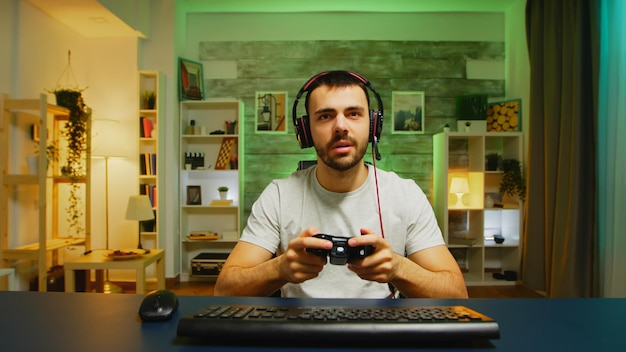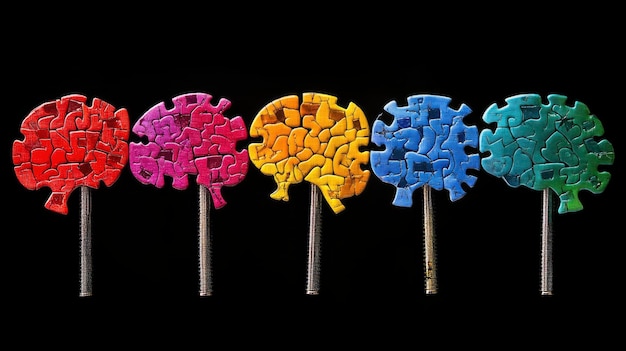Can Gaming Really Boost Your Mental Health? Benefits & Risks in 2025

Gaming, often seen as a pastime, can surprisingly offer mental health benefits like stress relief and cognitive skill enhancement; however, it also poses risks such as addiction and social isolation, necessitating a balanced approach in 2025.
Can playing video games actually be good for your mind? In 2025, as digital entertainment continues to evolve, the question of whether gaming can improve your mental health is more relevant than ever.
Gaming for Good: Exploring the Mental Perks
At first glance, video games might seem like a purely recreational activity. However, emerging research suggests that gaming can offer a surprising array of mental health benefits.
Let’s dive into the positive ways gaming can impact your well-being.

Stress Reduction and Mood Enhancement
One of the most immediate benefits of gaming is its ability to reduce stress. Immersing yourself in a game can provide a temporary escape from the pressures of daily life.
Many games offer a sense of accomplishment and reward, which can boost your mood and self-esteem.
Cognitive Skill Development
Certain types of games, such as strategy and puzzle games, can enhance cognitive skills like problem-solving, critical thinking, and reaction time. These skills can translate to real-world benefits in areas like work and education.
- Improved reaction time and decision-making skills.
- Enhanced problem-solving abilities through strategic gameplay.
- Increased attention span and concentration.
In conclusion, gaming offers some compelling mental perks, especially when it comes to stress reduction and cognitive skill development. By understanding these benefits, players can make informed choices about how they engage with video games.
The Flip Side: Understanding the Risks
While gaming can offer several mental health benefits, it’s crucial to acknowledge the potential risks involved.
Overdoing it can lead to negative consequences that impact your overall well-being. Let’s examine some of these potential downsides.
Addiction and Dependency
One of the most significant risks associated with gaming is addiction. When gaming becomes compulsive and interferes with daily life, relationships, and responsibilities, it can be a serious problem.
Recognizing the signs of gaming addiction is essential for preventing it from spiraling out of control.
Social Isolation and Reduced Physical Activity
Spending excessive amounts of time gaming can lead to social isolation and a sedentary lifestyle. This can have negative impacts on both your mental and physical health.

- Decreased face-to-face interactions with friends and family.
- Reduced participation in physical activities and hobbies.
- Increased risk of developing health problems associated with sedentary behavior.
In conclusion, while gaming can be a fun and engaging activity, it’s important to be mindful of the potential risks involved. By setting limits, practicing moderation, and prioritizing a balanced lifestyle, you can minimize these risks and enjoy gaming in a healthy way.
Finding Balance: Tips for Healthy Gaming in 2025
The key to enjoying the benefits of gaming while mitigating the risks lies in finding a healthy balance.
In 2025, with gaming more prevalent than ever, it’s important to establish strategies for responsible gaming habits.
Setting Time Limits
One of the most effective ways to prevent gaming addiction is to set time limits. Determine how much time you can realistically dedicate to gaming each day or week and stick to it.
Using timers or alarms can help you stay on track and avoid losing track of time.
Incorporating Physical Activity
Make sure to incorporate physical activity into your daily routine. This can help counteract the sedentary nature of gaming and promote overall health.
Even short bursts of exercise, like stretching or taking a walk, can make a big difference.
Prioritizing Social Connections
Prioritize face-to-face interactions with friends and family. This can help prevent feelings of isolation and promote a sense of connection.
- Schedule regular outings with loved ones.
- Participate in social activities and hobbies.
- Engage in meaningful conversations with people in your life.
In conclusion, healthy gaming is a balancing act. By setting time limits, incorporating physical activity, and prioritizing social connections, you can enjoy gaming without sacrificing your mental and physical well-being.
The Role of Gaming in Therapy and Mental Health Treatment
The potential of gaming as a tool for therapy and mental health treatment is gaining recognition. Innovative approaches are emerging that leverage the interactive and engaging nature of games.
Let’s explore how gaming is being used in therapeutic settings.
Therapeutic Games and Apps
A growing number of therapeutic games and apps are being developed to address specific mental health conditions. These games often incorporate evidence-based techniques and principles from cognitive behavioral therapy (CBT) and other therapeutic approaches.
They can be used to help individuals manage anxiety, depression, PTSD, and other mental health challenges.
Virtual Reality (VR) Therapy
Virtual reality (VR) technology is also being used in therapy to create immersive and interactive experiences for patients. VR can be used to treat phobias, anxiety disorders, and even PTSD by exposing individuals to simulated environments that trigger their fears or anxieties in a controlled and safe setting.
- VR exposure therapy for phobias and anxiety disorders.
- VR simulations for PTSD treatment and trauma processing.
- VR-based pain management techniques.
In conclusion, gaming is playing an increasingly important role in therapy and mental health treatment. As technology continues to advance, we can expect to see even more innovative applications of gaming in the field of mental health care.
Gaming Communities: Finding Support and Connection
Online gaming communities can provide valuable social support and connection for individuals struggling with mental health issues.
These communities offer a sense of belonging, acceptance, and shared experience.
Online Forums and Chat Groups
Many online forums and chat groups are dedicated to specific games or gaming communities. These platforms can provide a space for individuals to connect with others who share their interests and experiences.
These communities can offer a sense of validation, encouragement, and support during difficult times.
Team-Based Games and Social Interaction
Team-based games can foster collaboration, communication, and social interaction. Working together towards a common goal can promote a sense of camaraderie and teamwork.
These interactions can help individuals develop social skills and build meaningful relationships.
In conclusion, gaming communities can serve as valuable sources of social support and connection for individuals facing mental health challenges. By participating in these communities, individuals can find a sense of belonging, acceptance, and shared experience that can contribute to their overall well-being.
The Future of Gaming and Mental Health: Trends to Watch in 2025
As we move into 2025, several trends are shaping the intersection of gaming and mental health.
Innovations in technology, research, and accessibility are paving the way for a more integrated and supportive approach.
Personalized Gaming Experiences
Advances in artificial intelligence (AI) and data analytics are enabling the creation of personalized gaming experiences tailored to individual needs and preferences. Games can be designed to adapt to a player’s skill level, emotional state, and therapeutic goals.
This level of customization can enhance the effectiveness of gaming for mental health purposes.
Integration with Mental Health Services
We’re seeing increased integration of gaming into traditional mental health services. Therapists and counselors are beginning to incorporate games and VR experiences into their treatment plans. This can make therapy more engaging, accessible, and effective.
This integration can help reduce stigma and make mental health care more appealing to younger generations.
In conclusion, the future of gaming and mental health looks promising. With personalized experiences and increased integration with mental health services, gaming has the potential to play an even greater role in promoting well-being and providing support for individuals facing mental health challenges.
| Key Aspect | Brief Description |
|---|---|
| 🎮 Stress Relief | Gaming offers an escape and can reduce stress levels. |
| 🧠 Cognitive Skills | Games can enhance problem-solving and strategic thinking. |
| ⚠️ Addiction Risks | Overdoing gaming can lead to addiction and dependency. |
| 🧑🤝🧑 Social Support | Gaming communities offer connection and support. |
FAQ
▼
Yes, many find that gaming provides a temporary escape from daily stressors. The immersive nature and sense of accomplishment can reduce tension and boost mood.
▼
Strategy, puzzle, and memory games are particularly effective for enhancing cognitive skills. These games challenge your brain to think critically and solve problems creatively.
▼
Set time limits for gaming, balance it with other activities, and be aware of signs like neglecting responsibilities. Seek help if gaming interferes with your daily life.
▼
Yes, they can provide a sense of belonging and support. However, it’s important to ensure these communities are positive and not contributing to negativity or isolation.
▼
Absolutely. VR is being used to treat phobias, anxiety, and PTSD by simulating controlled environments. This allows individuals to confront their fears safely and effectively.
Conclusion
As we look to 2025, the relationship between gaming and mental health is complex. While gaming offers several potential benefits, it’s crucial to approach it with moderation and awareness. By finding a healthy balance and understanding the risks involved, individuals can maximize the positive impact of gaming on their well-being.